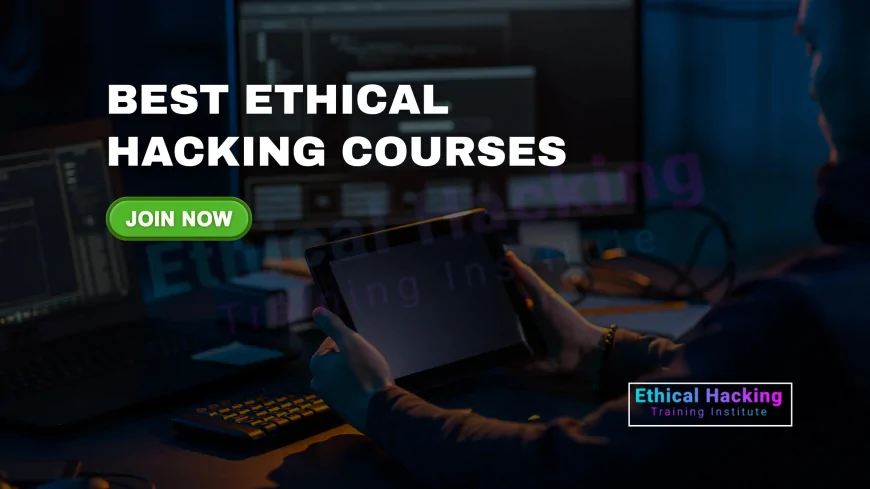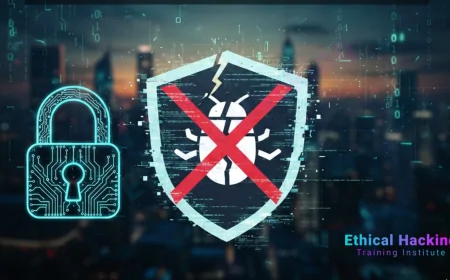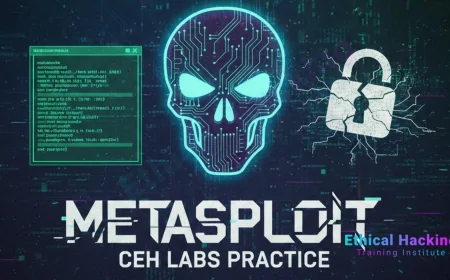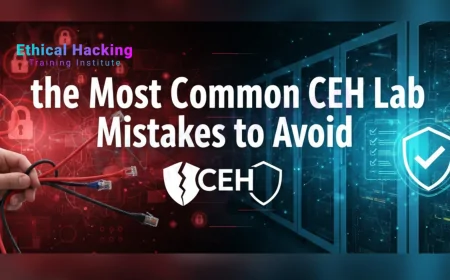Top Ethical Hacking Courses to Kickstart Your Cybersecurity Career | Learn Ethical Hacking: Best Courses to Launch a Cybersecurity Career
Wondering if there’s a free download option for a VAPT course? Learn everything about accessing free Vulnerability Assessment and Penetration Testing training online, including tools, platforms, and certifications to boost your cybersecurity skills.

Table of Contents
- Introduction
- Why Ethical Hacking?
- How to Choose the Right Course
- Overview of Top Courses
- 1. CEH (Certified Ethical Hacker) – EC‑Council
- 2. OSCP (Offensive Security Certified Professional)
- 3. TryHackMe – Cybersecurity Online Labs
- 4. Udemy Ethical Hacking – (e.g. Learn Ethical Hacking From Scratch)
- 5. Pentesting School by Pentester Academy
- 6. SANS SEC560/SEC504
- 7. Cybrary Ethical Hacking Course
- 8. Intensive Bootcamps (e.g. SecureNinja, Koenig)
- Course Comparison
- Suggested Learning Path
- Skills You'll Gain
- Career Opportunities
- Pricing & ROI
- Tips to Succeed
- Future Trends in Ethical Hacking
- FAQs
- Conclusion
Introduction
Today’s digital landscape demands robust cybersecurity. Ethical hackers—also called white-hat hackers—play a vital role in identifying vulnerabilities before malicious actors do. This comprehensive guide reviews the top ethical hacking courses (online and offline) that can propel your cybersecurity career, offering detailed insights into curriculum, tools, practical labs, career outcomes, and investments required.
Why Ethical Hacking?
Ethical hacking is not just a profession—it’s a responsibility. The global demand for cybersecurity professionals is expected to outpace supply, with over 6 million jobs projected to remain unfilled by 2025.
- Detect and remediate security flaws
- Perform penetration testing and vulnerability assessments
- Secure web, network, cloud, IoT, and mobile environments
- Test organizational readiness through red team exercises
How to Choose the Right Course
Here’s a checklist:
- Accreditation (EC-Council, Offensive Security, SANS)
- Hands-on labs and virtual environments
- Instructor expertise and community engagement
- Certification recognition
- Support resources (forums, mentorship)
- Career services and placement support
Now let’s explore the top options.
Overview of Top Courses
1. CEH (Certified Ethical Hacker) – EC‑Council
Overview: Industry-leading mid-level certification, covering network mapping, system hacking, malware, web and wireless attacks.
Delivery: Official iLearn, accredited partners, online, classroom.
Hands-on Labs: iLabs virtual hacking environment.
Exam: 125 MCQs in 4 hours; optional CEH (Practical) 6‑hour lab exam.
Ideal for: Entry/intermediate cybersecurity professionals, network admins.
2. OSCP (Offensive Security Certified Professional)
Overview: Highly challenging, 100% hands-on penetration testing course with lab access.
Delivery: Self-paced via OffSec PWK course.
Lab: Lab environment simulates a broad network of systems, mirroring real-world cybersecurity challenges.
Exam: 24‑hour practical hacking test; detailed report required.
Ideal for: Those seeking hardcore offensive security roles.
3. TryHackMe – Cybersecurity Online Labs
Overview: Beginner to advanced, gamified cybersecurity learning platform.
Delivery: Browser-based, guided “Rooms” with goals and hints.
Coverage: Networking, reconnaissance, web attacks, active directory, threat intelligence.
Ideal for: Newcomers or those building hands-on skillsets affordably.
4. Udemy’s ‘Learn Ethical Hacking From Scratch’ course helps beginners get started with cybersecurity basics."
Overview: Popular course covering Kali Linux, Nmap, Metasploit, Burp Suite, Wi‑Fi attacks.
Delivery: Video-based, lifetime access, community Q&A.
Ideal for: Self-starters exploring ethical hacking freely.
5. Pentesting School – Pentester Academy
Overview: Modular labs for exploit dev, mobile, cloud pentesting.
Delivery: Live & self-paced; Linux, shellcoding, Android/iOS labs.
Ideal for: Intermediate hackers targeting specialized domains.
6. SANS SEC560 / SEC504
Overview: Rigorous, enterprise-grade pentest training with GIAC GPEN cert option.
Delivery: Classroom, live-virtual, self-paced.
Labs: Advanced attack simulations.
Ideal for: Corporate cybersecurity professionals or compliance-heavy roles.
7. Cybrary Ethical Hacking Course
Overview: Modular content + virtual labs, CompTIA-style certification prep.
Delivery: Free & paid membership.
Ideal for: Beginners and budget-conscious learners.
8. Intensive Bootcamps (SecureNinja, Koenig, Simplilearn)
Overview: Short-term, high-intensity, instructor-led bootcamps.
Delivery: Online or in-person bootcamps.
Ideal for: Fast-paced learners targeting job readiness.
Course Comparison
| Course | Level | Hands‑on Labs | Certification | Price (USD) |
|---|---|---|---|---|
| CEH | Intermediate | Moderate | CEH + CEH (Practical) | $1,200–$3,500 |
| OSCP | Advanced | Extensive | OSCP | $800–$1,499 (lab access incl.) |
| TryHackMe | All Levels | Extensive | Badges | $0–$10/month |
| Udemy | Beginner | Basic | Certificate of Completion | $10–$30 |
| Pentesting School | Intermediate–Advanced | Extensive | Completion Cert | $500–$1,000 |
| SANS SEC560/504 | Advanced | Extensive | GIAC GPEN | $6,000–$7,000 |
| Cybrary | Beginner–Intermediate | Good | Certificates | $0–$99/month |
| Bootcamps | Beginner–Intermediate | High | Various Certs | $2,000–$5,000 |
Suggested Learning Path
- Foundational skills with TryHackMe or Cybrary.
- Pick CEH for structured certification or Udemy/Pentesting School for flexibility.
- Step into OSCP for hardcore pentesting.
- Use bootcamps or SANS for enterprise readiness.
Skills You'll Gain
- Network mapping and vulnerability scanning
- Web app hacking (XSS, SQLi, CSRF)
- Buffer overflows and exploit development
- Wireless and mobile security
- Cloud, IoT, Active Directory pentesting
- Report writing and compliance documentation
Career Opportunities
You can pursue roles such as:
- Ethical Hacker / Penetration Tester
- Security Analyst / SOC Analyst
- Red Team Specialist
- Vulnerability Assessor
- Security Consultant / Engineer
Average salaries range USD 45K–150K depending on experience and region.
Pricing & ROI
Investments vary from free community platforms to premium programs like SANS. ROI depends on:
- Certification brand
- Job placement support
- Regional demand (e.g., high in India, USA, EU)
Tips to Succeed
- Set SMART learning goals
- Practice daily in labs or virtual environments
- Join community forums (Reddit, Discord, StackOverflow)
- Build a public portfolio (GitHub, write-ups)
- Engage in Capture the Flag (CTF) events
Future Trends in Ethical Hacking
Stay ahead by learning:
- AI-driven vulnerability scanning
- Cloud-native pentesting (AWS, Azure)
- 5G and edge device security
- Secure DevOps and infrastructure as code testing
- IoT/IIoT and connected car hacking
FAQs
1. What is VAPT?
- VAPT stands for Vulnerability Assessment and Penetration Testing. It is a comprehensive approach to identifying and addressing security vulnerabilities in IT systems and networks.
2. Can I find a VAPT course for free?
- Yes, many online platforms offer free VAPT courses or introductory lessons, including Udemy, Cybrary, and YouTube.
3. Are free VAPT courses useful for beginners?
- Absolutely. Free courses provide foundational knowledge in ethical hacking, scanning, and penetration testing, ideal for beginners exploring cybersecurity.
4. Where can I download free VAPT training materials?
- You can download free VAPT materials from platforms like GitHub, Cybrary, and some open-source cybersecurity blogs or forums.
5. Do free VAPT courses come with certification?
- Not always. While the course content may be free, certifications often require a fee or exam registration.
6. What tools are used in VAPT courses?
- Popular tools include Nmap, Metasploit, Burp Suite, Wireshark, Nessus, and OWASP ZAP.
7. Can I practice VAPT on my own system?
- Yes, but it’s recommended to use safe, virtual environments like VirtualBox, Kali Linux, or intentionally vulnerable machines such as Metasploitable.
8. Is downloading paid VAPT courses for free legal?
- No. Piracy of paid courses is illegal and unethical. Always use legitimate sources for your learning.
9. Are VAPT skills in demand?
- Yes, VAPT professionals are in high demand across sectors like IT, finance, defense, and government.
10. How long does it take to learn VAPT?
- Depending on your background, basic VAPT skills can be acquired in 1 to 3 months, but mastering advanced techniques may take longer.
11. Are there government-sponsored free VAPT courses?
- Yes. Platforms like NASSCOM FutureSkills or Cyber Swachhta Kendra occasionally offer free or subsidized training.
12. What is the difference between vulnerability assessment and penetration testing?
- Vulnerability assessment identifies security flaws, while penetration testing actively exploits them to test their severity and impact.
13. Can I get a job with just a free VAPT course?
- Free courses help you build a foundation, but employers typically prefer candidates with certifications and hands-on experience.
14. Is CEH the same as VAPT?
- No. CEH (Certified Ethical Hacker) is a broad certification in ethical hacking, whereas VAPT focuses more specifically on assessment and testing.
15. Do free courses cover real-world VAPT scenarios?
- Some free courses do include practical labs and real-world scenarios, though premium courses tend to offer more in-depth simulations.
16. Which free VAPT course is best for certification preparation?
- Cybrary and TryHackMe offer structured, hands-on paths that can prepare you for certifications like CEH, OSCP, and CompTIA PenTest+.
17. Is VAPT the same as bug bounty?
- They are related but not the same. Bug bounty involves identifying and reporting vulnerabilities in exchange for rewards, while VAPT is systematic testing for organizations.
18. Can I do VAPT legally?
- Yes, but only with proper authorization. Unethical or unauthorized penetration testing is illegal and punishable under cybersecurity laws.
19. Are mobile apps covered in VAPT training?
- Yes, advanced VAPT training often includes mobile application security testing for Android and iOS.
20. What’s the career scope after learning VAPT?
- You can pursue roles like penetration tester, ethical hacker, security analyst, or SOC analyst, with growing demand in India and globally.
Conclusion
Choosing the right ethical hacking course depends on your starting point and career ambitions. Beginners can start with print‑and‑play platforms like TryHackMe, and then step into certification paths like CEH or OSCP. Enterprise-ready roles may require SANS-level coursework or intensive bootcamps. What matters most is consistency, hands‑on practice, and a demonstrable portfolio. Armed with the knowledge and credentials from these top courses, you're well-positioned to enter and excel in the cybersecurity industry.
What's Your Reaction?
 Like
0
Like
0
 Dislike
0
Dislike
0
 Love
0
Love
0
 Funny
0
Funny
0
 Angry
0
Angry
0
 Sad
0
Sad
0
 Wow
0
Wow
0

















